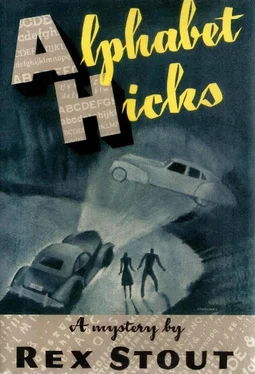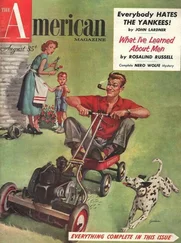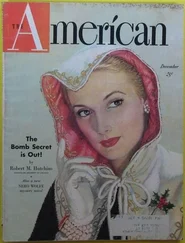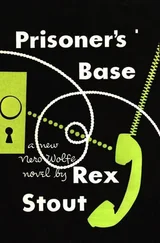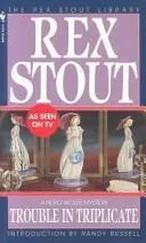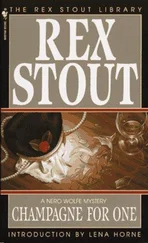“I can’t stay here. I can’t! I’m going to leave.”
“It would have been a good thing for all of us,” Dundee said harshly, “if you had reached that decision a week ago. Perhaps if you hadn’t been here—”
“Shut up,” Hicks said rudely. He got up to approach Heather. “Don’t mind him, he’s having a fit. Did the district attorney tell you you can leave?”
“No, but I’m going to. I can’t—”
“Okay, we’ll see. At least we’ll leave this room.” Hicks spoke to Dundee: “For God’s sake calm down a little. Put cold compresses on your head. Comb your hair.”
“He motioned Heather ahead and followed her out. Across the hall and down a dozen paces was the door to her room. When they were inside and the door was closed, Heather said:
“I can’t talk even in my own room. That’s why he was taking me to the district attorney. I was in here talking and Mr. Brager and a man were in his room and heard us, and Mr. Brager tapped on the wall to warn us—”
“Then talk low. Keep your voice down.” Hicks went and shut the window and came back. “Who were you talking with?”
“Ross Dundee. I was here and he came—”
“To ask about the sonograph plate?”
“No. At least — he didn’t. But I did. I asked him where he got a plate with my sister’s voice on it.”
“Which is what I told you—”
“I know you did. It came out before I knew it.”
“Keep your voice down. This should interest you. Cooper was murdered because he mentioned that plate. Maybe you realize now that I wasn’t talking through my hat. A man has got himself into a hole that he can’t get out of, but before he quits trying he’ll kill you and me too if he can manage it.”
They were standing, facing each other. Heather’s head was tilted so that her eyes, on a level with his chin, were looking straight into his. Her voice came out a whisper:
“What man?”
Hicks shook his head. “Maybe I know. Maybe I don’t. I came out here to increase my knowledge and ran into this. Was there ever a sonotel installed in this house?”
“Yes. There’s one now, in the wall of the living room.”
“That would amuse Corbett. He’d like that, doing his questioning in a room wired for sound. When was it installed?”
“It was there when I came, over a year ago. It was used for experimenting. About two months ago it was taken out and a new one was put in, a new model.”
“Who installed it?”
“I don’t know about the old one. Ross Dundee installed the new one.”
“Keep your voice down,” Hicks admonished her. “Today. About Cooper. You were at the laboratory with Brager when it happened?”
“Yes. He came and said George was there — no, he told me that when we were in the woods—”
“Tell me what happened at the laboratory.”
She told him. He took it in, asked a few questions, nodded as if satisfied, and said:
“Okay. That’ll do for now. We can cover some other points on our way to New York. The best—”
“To New York?”
“Certainly. You say you want to get away from here, which I can understand, and I have something to do somewhere else. So we might as well go together. The car you lent me is backed into the entrance of a pasture lane up the road about four hundred yards toward Katonah. Do you know where that is?”
“Yes. The other side of the old orchard.”
“There’s a house a short distance beyond.”
“Yes. Darby’s.”
“We’d better not try to leave here together. They won’t be keeping close watch on you, and if you’re any good you can make it. You know the ground. Circle around through the orchard and pasture. Are you afraid to try that?”
“Afraid? Of course not!”
“Good for you. I’ll join you as soon as I can. I have a little errand to do here before I leave, and it’ll be harder for me to get away. They’ll miss me. Be patient and take a nap in the back seat. Change to a dark dress and don’t try taking any luggage. In case of a slip-up — wait a minute.”
Hicks frowned. “I’ve got the key to the car. Is there another one around?”
“Yes, in a drawer in the dining room.”
“Can you get it?”
“Of course.”
“You’re a wonder. When you grow up and get big like me you’ll be President.” Hicks sat down and untied a shoelace and removed the shoe. He put the shoe on his lap and got his wallet and a memo book from a pocket. From the wallet he extracted a baggage check and glanced at it, then wrote something on a page of the memo book, tore it out, handed it to Heather, slipped the baggage check into the shoe, and put the shoe back on.
“There,” he said, “keep that in a safe place. Your shoe will do. It’s the number of the check for something I left in the parcel room at Grand Central. In case anything regrettable happens to me, here’s what you do. Get Dundee’s wife, Mrs. R. I. Dundee, and go with her to Inspector Vetch of the New York police, and both of you tell him everything you know. Everything. Don’t hold out on him. Give him the number of that check and tell him to get it. Vetch is a good guy, once you get used to his mannerisms. You’ll like him.”
“But what—” Heather was gazing at him. “Why do you think anything—”
“I don’t. But this individual we’re after has apparently got a screw loose. Getting Cooper like that in broad daylight! He’s so scared there’s no telling what he’ll try next, so just to fool him we make these little arrangements. By the way, I should warn you, when you meet Mrs. Dundee you’re going to get a shock. Be prepared for it.”
“A shock? Why a shock?”
Hicks patted her on the shoulder. “You’ll understand when you meet her. Go ahead and change your dress — or wear that long dark coat you had on last night—”
“I’m not going to meet her,” Heather said, “unless you — unless something—”
“Right. So the chances are you’ll never have the pleasure. I’ll explain further on our way to town. Probably—”
The door swung open and R. I. Dundee barged in.
“Irving’s here. My lawyer,” he snapped.
“Coming,” Hicks said. He smiled at Heather. “See you later.”
He followed Dundee out.
Heather had scornfully repudiated Hicks’s suggestion that she might be afraid.
She would certainly have denied that it was fear that made her heart beat faster when she entered the kitchen and found that Mrs. Powell was still there, washing up, and a state policeman in uniform was standing by the corner cupboard, drinking coffee. Mrs. Powell glanced at her, saw the long dark coat, and asked:
“Going out?”
“Just for a breath of air,” Heather said.
From the corner of her eye she saw that the policeman was looking at her, and, though he said nothing, she was convinced that if she started for the door he would stop her. She hesitated, became acutely aware that she was acting unnaturally, and turned and made for the door to the dining room, where she had just come from after getting the extra car key. She stood there a moment, berating herself as a coward and a ninny, and then went on through to the side hall. Without a glance at a man on a chair by the door to the living room, she opened the outer door and was on the terrace, and felt her heart start thumping again at the sight of another state policeman standing in a ray of light from a window. That made her mad. She addressed him without regard for the fact that she was interrupting something he was saying to Ross Dundee:
“If anyone wants me you can call,” she said. “I’ll be around within hearing.”
“Very well, Miss Gladd,” he replied, in a tone not only acquiescent but positively sympathetic.
Читать дальше
